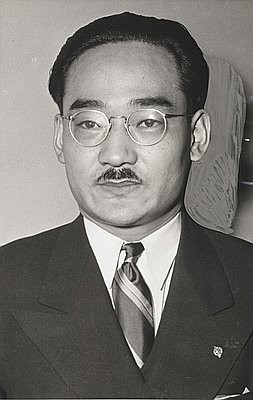Oregonian Lawyer, Civil Rights Activist to Receive Presidential Medal of Freedom
Wednesday, November 18, 2015

Yasui was the first Japanese-American to graduate from the University of Oregon’s School of Law and made national history by challenging the military curfew imposed on Japanese-American citizens during WWII.
According to the Oregon Encyclopedia, Yasui was born in Hood River on October 16, 1961, and graduated from the UO School of Law in 1939, becoming the first Japanese American member of the Oregon Bar.
After the attacks on Pearl Harbor in 1941, Yasui returned to Oregon from Chicago, expected to be called into service after being commissioned as a second lieutenant in the U.S. Army Infantry Reserve, but the army refused to accept him for active duty.
During World War II, Lt. Gen. John L. DeWitt of the Western Defense Command argued that imprisonment of Japanese-Americans was necessary after the bombing of Pearl Harbor. After President Franklin Roosevelt issued Executive order 9066, DeWitt issued a number of military orders, including a curfew that ordered all German nationals, Italian nationals, and persons of Japanese ancestry to remain in their homes between the hours of 8 PM and 6 PMViolating the curfew was a criminal offense under federal law.
Yeas believed the orders were unconstitutional when applied to U.S. citizens and in March of 1942, walked the streets of Portland, intentionally breaking the curfew and leading to his arrest.
Yasuri argued that the 14th and 15th Amendments of the U.S. Constitution guaranteed the civil rights of citizens, but was found guilty in federal court. He appealed his case all the way to the U.S, Supreme Court, where the court ruled against him. He spent nine months in solitary confinement as a result of the conviction.
Related Articles
- Xocolatl De David Brings Home 4 Medals from International Chocolate Awards
- Oregon History Makers Medal Recipients Include Ann Curry
- Obama Awards Medal of Honor to Army Captain Florent Groberg
- Portland Bar & Bartenders Finalists for The Spirited Awards
- Pix Patisserie Awarded with World’s Best List of Champagne and Sparkling Wine
- Portland Children’s Museum Awarded Large Grant
- Portland Community College Advisor Wins State Award
- Portland State Awarded $24 Million to Help Diverse and Disadvantaged Students
- PCC SBDC Head Wins State Small Business Award
- Party Report: Oregon Governor’s Film Awards
- Old Town Brewing’s Award Winning Beer in Bottles
- OHSU Scientist Awarded $25 Million Grant for HIV Vaccine Research
- Oregon Lottery Receives International Lottery Conference Award
- Party Report: Albertina Kerr Community Awards Luncheon With Storm Large
- Party Report: Oregon Actors Awards at BodyVox
- Portland Thorns FC Announce 2015 Club Awards
- Portland Threads: Portland Fashion and Style Awards
- U.S. Government Awards Oregon Homeless Agencies Over $26 Million in Grants
- Third Annual Portland Fashion and Style Awards Preview
- Umpqua Bank Awards Arrow Coffeehouse With $10,000 Grant
- Will Vinton Earns Lifetime Award at Portland Film Festival
- SBA is Accepting Nominations for 2016 Small Business Week Awards
- Portland Well Represented Among James Beard Award Nominees
- Portlandia Wins Art Directors Guild Award for Second Year in A Row
- Recap: Portland Fashion and Style Awards
- Sarah Pliner Nominated For The People’s Best New Chef Award
- Nominations Now Open for 2015 Governor’s Volunteer Awards
- Beaverton Wins National Cultural Diversity Award
- Award-Winning NY Times Columnist to Speak at OHSU Memorial Lecture
- Cheryl Strayed in Michelle DeCourcy Gown at Academy Awards
- Cheryl Strayed to be Keynote Speaker at Community Awards Luncheon
- Equity Foundation Awards Funds to All Grant Applicants
- Award Winning Portland Chef Returns to Little Bird Bistro
- Award Winning Ensemble to Perform in Portland
- A Sour Ending to the Heisman Trophy Award Ceremony
- Albertina Kerr To Hold 108th Annual Meeting and Community Awards Luncheon Today
- Arianna Huffington to Keynote Portland State Awards Dinner
- Auto Hollywood: The Cars With The Most Awards This Year
- French President Awards Highest Honor for Bravery to Oregon Native
- Multnomah County Awarded $4.4 M for Faulty Morrison Bridge Deck
- Milepost 5 Presents Award-winning Poets, Kirstin Roedell and Wayne Lee
- Multnomah County Awarded $6.25 Million To Help Combat Teen Pregnancy
- Neil Everett To Host The 63rd Annual Nike Oregon Sports Awards
- Neil Everett To Host The 63rd Annual Nike Oregon Sports Awards
- Marcus Mariota Wins His First ESPY Award
- Local Public Art Projects Receive National Awards
- FTA Admin. Therese McMillan to Award $38.5 Million Transit Grant to C-TRAN
- Gates Foundation Awards $420,000 to OHSU for Women’s Nutrition and Wellness Summit
- Leather Storrs: James Beard Awards and the Changing Culinary Industry
- Local Literary Reading Hosts Award Winning Authors
- 2015 Oregon Technology Awards Finalists Announced




Follow us on Pinterest Google + Facebook Twitter See It Read It